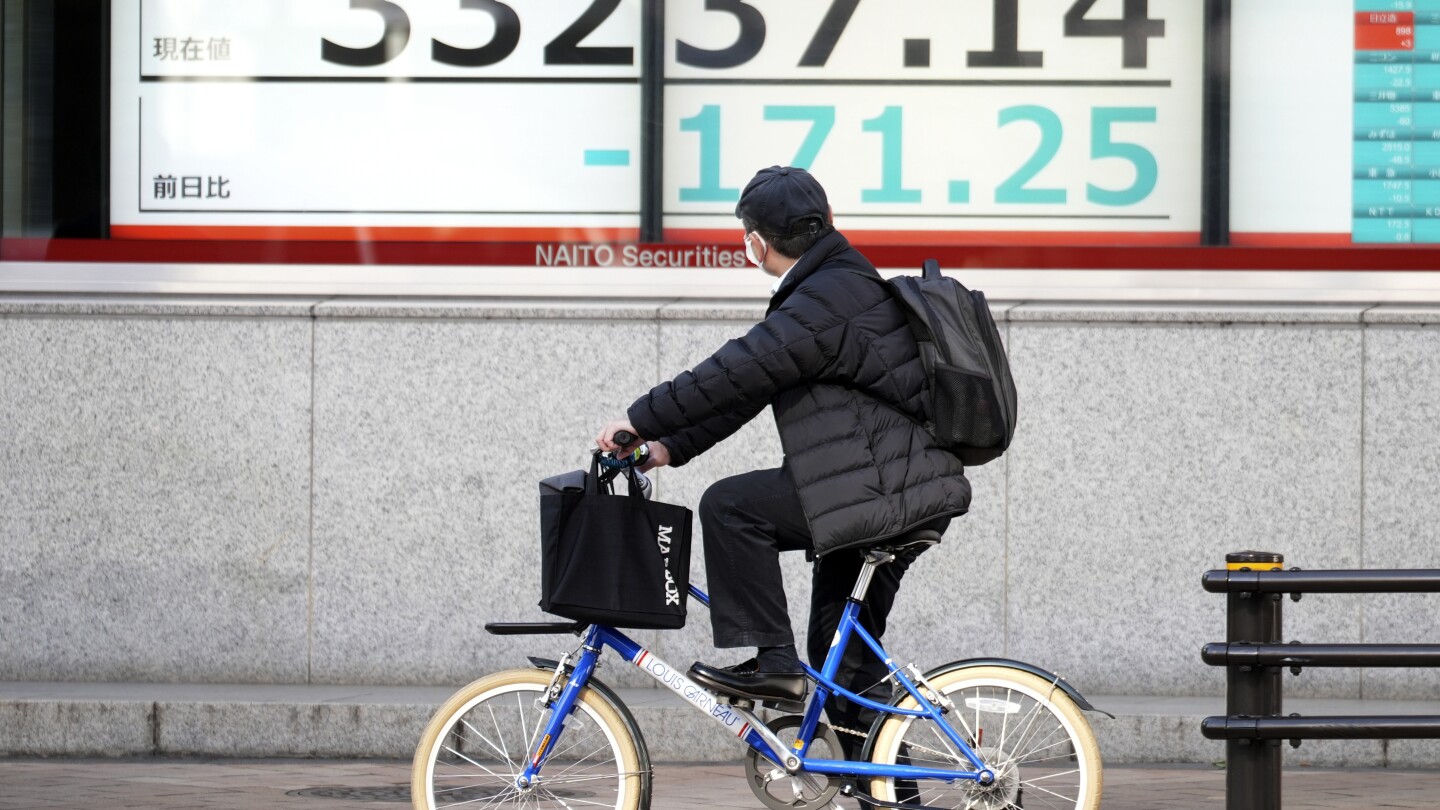TOKYO (AP) — Asian shares mostly fell Wednesday although a strong report on U.S. consumer confidence and hopes the Federal Reserve is finished with its aggressive interest rate hikes sent shares higher on Wall Street.
Japan’s benchmark Nikkei 225 declined 0.3% to finish at 33,321.22. Australia’s S&P/ASX 200 gained 0.3% to 7,035.30. South Korea’s Kospi shed nearly 0.2% to 2,518.10.
Hong Kong’s Hang Seng dropped 2.4% to 16,940.09, while the Shanghai Composite fell 0.5% to 3,022.08.
Heavy selling of Chinese technology and property shares pulled benchmarks lower. Food delivery company Meituan’s Hong Kong-traded shares dropped 11% after it forecast its revenue will fall in the current quarter. Troubled property developer China Evergrande sank 9.2% following reports that its property services group was suing the parent company to recover deposit guarantees.
Oil prices were little changed ahead of a meeting of OPEC members set for Thursday.
“OPEC+ is struggling to reach an agreement to extend production cuts, leaving the oil market in flux, Matthew Weller of Forex.com said in a report. ”While not the most likely scenario, a collapse in talks could take oil prices to multi-month lows.”
Benchmark U.S. crude edged up 13 cents to $76.54 a barrel in electronic trading on the New York Mercantile Exchange. It gained $1.55 to $76.41 a barrel on Tuesday.
Brent crude lost 2 cents to $81.66 a barrel.
Tuesday on Wall Street, the S&P 500 edged up 0.1% to 4,554.89 after hovering between small gains and losses. The benchmark index is on track to close out November with its strongest monthly gain of the year. The Dow Jones Industrial Average rose 0.2% to 35,416.98 and the Nasdaq composite eked out a 0.3% gain to 14,281.76.
Gains in technology stocks, retailers and other sectors helped temper declines elsewhere in the market. Microsoft rose 1.1%, Tesla climbed 4.5% and Best Buy rose 2.4%. GE Healthcare Technologies was among the biggest decliners, closing 4.2% lower.
Bond yields fell. The 10-year Treasury yield, which influences mortgage rates, slipped to 4.30% from 4.39% late Monday. The yield on the two-year Treasury, which tracks expectations for Federal Reserve action, fell significantly, to 4.73% from 4.89% late Monday.
Investors are closely watching several economic updates this week for more clues about how consumers feel and whether the rate of inflation is still easing.
Consumer confidence remains strong heading into the holiday shopping season. The Conference Board’s November consumer confidence survey released Tuesday topped analysts’ forecasts. Consumer spending accounts for around 70% of U.S. economic activity and it has remained a bulwark against slower economic growth.
On Thursday the government released its October data on the Fed’s preferred measure of inflation. Economists expect that measure to continue easing, as it has been since the middle of 2022. The loosening grip from inflation and a resilient economy have raised hopes that the Fed might finally be finished with raising its benchmark interest rate.
Hopes that the Fed will keep its benchmark interest rate steady were reaffirmed Tuesday by Christopher Waller, a member of the Fed’s Board of Governors.
“I am increasingly confident that policy is currently well-positioned to slow the economy and get inflation back to 2%,” Waller said in a speech at the American Enterprise Institute, a Washington think tank.
The Fed will meet again in December to update its interest rate policy. The central bank had been raising rates to push the rate of inflation back down to 2% and has been closing in on that goal. Inflation has plunged from a peak of 9.1% in June 2022 to 3.2% in October.
The central bank has been working to lower rates while trying to avoid a recession in what is referred to as a “soft landing” for the economy. The latest economic data adds to hopes for that outcome.
In currency trading, the U.S. dollar fell to 147.10 Japanese yen from 147.50 yen. The euro cost $1.1004, up from $1.0992.
___
AP Business Writers Damian J. Troise and Alex Veiga contributed to this report.

